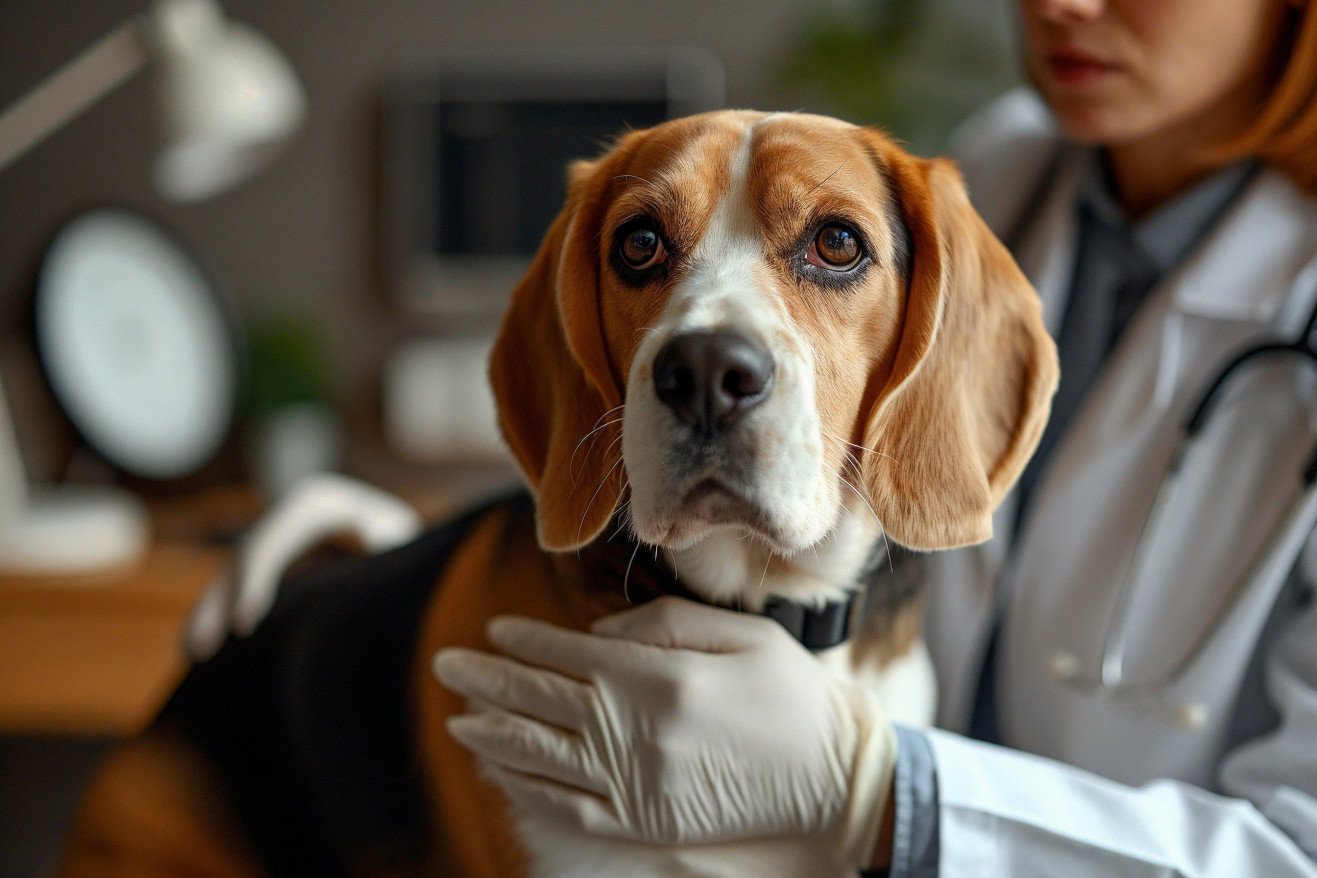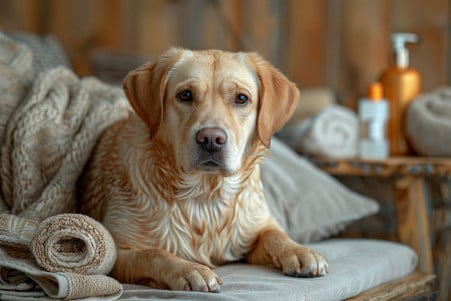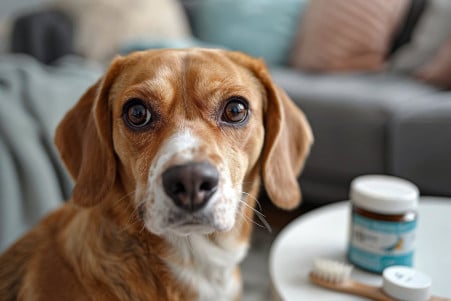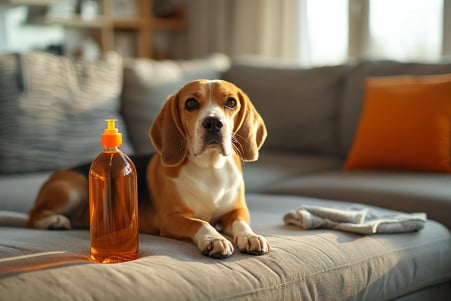How to Get Rid of Anal Gland Smell: Advice from the Experts
6 February 2024 • Updated 6 February 2024

That unmistakable dog gland odor – it’s not just you noticing that pungent aroma. To eliminate dog gland smell, regularly express the anal glands, maintain a high-fiber diet, and ensure proper hydration. Use enzymatic cleaners for odor removal in the home. If issues persist, a veterinarian may administer treatments such as antibiotics or surgery.
This article will cover an extensive list of research and expert advice from veterinary science, pet nutrition, and grooming best practices. This information will help us uncover the causes of dog gland odors and find the best ways to treat and prevent them. We’ll cover dietary changes and hygiene practices, so you’ll be well-prepared to make sure your dog is happy and your home is odor-free.
What is the most effective method for eliminating anal gland smell in dogs?
What Do Anal Glands Do in Dogs?
Each dog has two anal glands, or anal sacs, located on either side of the anus. These glands are important for dog-to-dog communication, as the secretions they produce have a scent that carries a lot of information about the dog they came from. The American Kennel Club says that dogs use the secretions to mark their territory and to identify themselves. The secretions are oily and have a strong, fishy smell.
Unfortunately, these glands can also cause problems, leading to issues like impaction, infection, or abscesses, which can make the smell even worse. Impaction occurs when the glands don’t empty properly due to issues with the dog’s stool or other health problems. Infections and abscesses make the problem even more painful and urgent, so it’s important to get to the vet right away to avoid further issues, according to My Vet Animal Hospital.
Some breeds, especially small dogs and those that are overweight, are more prone to anal gland problems. PetMD explains that obesity, allergies, skin mites, hypothyroidism, and environmental factors can all make dogs more likely to have anal gland problems.
It’s important to address these issues, and one way to do that is to make dietary changes, which we’ll talk about more below. Making dietary changes is important for keeping your dog’s anal glands healthy and keeping the smell to a minimum.
How to Feed Your Dog for Healthy Anal Glands
A healthy diet is crucial to supporting your dog’s anal gland health and keeping odors at bay. Veterinary professionals, such as Dr. Steve Sanderlin, suggest that the best dog foods are natural and can help with anal gland expression. A high-fiber diet is especially helpful because it can help to bulk up stools, which will naturally express the glands when your dog has a bowel movement.
You can make sure your dog gets enough fiber in their diet by adding fresh vegetables, lean proteins, and complex carbs like sweet potatoes and oats. Wag also suggests that adding pumpkin, apples, and oatmeal can help increase fiber and ensure that your dog has a healthy stool that will help with gland function.
In addition, experts suggest that adding supplements like omega-3 fatty acids can help support a healthy immune system and inflammatory response, which can help support the overall health of the glands.
It’s easy to make these changes to your dog’s diet. You can start by slowly adding high-fiber foods and supplements to your dog’s meals and then monitor their stool and anal gland health.
It’s important to note that the consistency and quality of your dog’s diet are just as important as the foods that are included in it. Butternut Box explains that it’s important to feed your dog meals that are customized to make sure that they get the right nutrients that are tailored to their unique needs.
By being mindful of your dog’s diet, you can help prevent gland impaction and reduce the risk of infections, which can help keep your dog happier and more comfortable.
Professional Treatment for Your Dog’s Anal Gland Health
If a dog’s anal glands are not emptying properly, a veterinarian may need to perform professional gland expression. In the best-case scenario, the vet will manually express the glands during routine checkups to relieve the dog’s discomfort and prevent the build-up that can lead to infection or impaction.
In cases of anal sacculitis, the vet may also flush the anal sac with an antiseptic solution and infuse antibiotics and corticosteroids to treat the inflammation, according to the College of Veterinary Medicine at Cornell University.
It’s important to seek veterinary care if the odor persists or if there are signs of infection, such as swelling, redness, or discharge.
According to the Royal Veterinary College, a study showed that anal sac disorders (ASD) can lead to more severe health issues if they are not treated.
In cases of chronic issues, veterinarians may opt to remove the anal sacs surgically. While surgery is performed in less than 1% of ASD cases, it is an option if other treatments have not been successful. However, the risks, including potential infection and fecal incontinence, need to be weighed against the benefits of relieving the dog’s pain and preventing recurrent infections.
It is important for pet owners and veterinarians to work together to manage their dogs’ anal gland health. Taking a proactive approach to care, including making dietary changes and ensuring regular vet visits, can help ensure that gland issues don’t progress to more serious conditions. With professional guidance that is tailored to the individual needs of their pets, pet owners can help ensure that their dogs are comfortable and that their homes smell fresh.
How to Keep Anal Glands Healthy
Good hygiene is important for keeping your dog’s anal glands healthy and preventing the smells that come with impacted or infected glands. Regular baths and grooming can help keep the anal gland secretions from getting too thick and leading to impaction.
Good hygiene is important for keeping your dog’s anal glands healthy and preventing the smells that come with impacted or infected glands. Regular baths and grooming can help keep the anal gland secretions from getting too thick and leading to impaction.
It’s important to note that while good hygiene is important for keeping your dog’s anal glands healthy, it’s also important for overall pet health, and grooming should include attention to the anal glands to make sure they are expressed naturally.
In addition to grooming, keeping your home clean can help you manage the smells associated with anal glands. Dr. Julie Buzby, an integrative veterinarian, recommends using white vinegar or pet deodorizing wipes to neutralize the smell of anal gland secretions on fabrics. For cleaning, enzymatic cleaners can be used to break down odors that are safe for pets and can help you get rid of the fishy smell without resorting to harsh chemicals.
That said, it’s important to remember that keeping an eye on your dog for signs of anal gland issues, such as scooting or a persistent bad smell, is the most important thing you can do. Regular checks and good hygiene can help you catch any issues early. Recommended products for odor neutralization include pet-safe shampoos and grooming sprays that are gentle on your dog’s skin and effective against unwanted smells.
By incorporating these hygiene practices into your regular routine, you can help keep your dog happy and comfortable and your home smelling fresh, which will ultimately benefit the health and happiness of both your pet and your family.
Final Thoughts on Getting Rid of the Dog Anal Gland Smell
We’ve gone through several ways to get rid of the smelly dog anal gland odor, and it’s clear that a combination of these methods is the most effective. A high-fiber diet can help ensure that your dog’s anal glands are expressed regularly, and making sure your dog is drinking enough water is important for their overall health.
Make sure to get professional gland expression when needed, as vets can help with more serious issues. And of course, don’t forget the importance of regular grooming and keeping your home clean in terms of preventing and getting rid of odors.
The bottom line is that you’ll be most successful in keeping your dog’s anal glands healthy and your home smelling fresh if you’re thorough and consistent in your approach. As pet parents, it’s our job to keep an eye on our pets for signs of discomfort or illness and to make sure they get the care they need in a timely manner.
In doing so, we’ll not only improve our pets’ quality of life but also make our homes more pleasant places to live.
Let’s take on these tasks with dedication and love, and remember that a healthy pet is a happy home.


